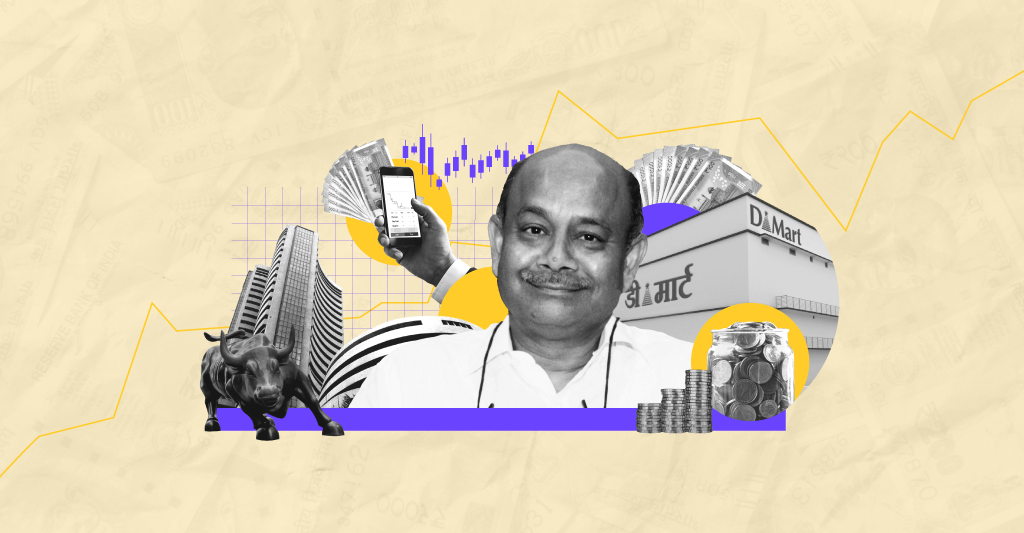Last Updated on Jan 5, 2022 by Aradhana Gotur
Rakesh Jhunjhunwala’s portfolio grew by 91% in the last 5 yrs. Many people follow his investing style, but there’s another unsung hero in the stock market: Radhakishan Damani, whose portfolio grew by 4,000% in the last 5 yrs! Let’s hear 10 fascinating facts about this self-made billionaire.
Table of Contents
1. The transition from a small businessman to stock trader
Although Radhakishan Damani was born in a Marwari family that ran a stock broking business, he was hardly interested in the market. He dropped out of college and ran a small business of ball bearings. However, at age 32, Damani joined his family business following the untimely passing of his father. But he soon realised that broking alone could not make him real money, which is when he started trading.
2. Made a fortune by shorting stocks
When Harshad Mehta was busy manipulating the prices of a few stocks, Damani focused on shorting them. And when Mehta’s scam came in the open, Radhakishan made a significant windfall. Had it been delayed by even a week, Damani says, he would have been bankrupt.
3. Embracing the style of value investing
Although Damani made significant wealth off the Harshad Mehta scam, his portfolio was also impacted. That is when Damani started following Chandrakant Sampat and jumped from stock trading to value investing. Says Damani that he buys stocks he believes in and holds them for anywhere between 5 to 10 yrs. Warren buffet also believes in value investing.
4. The inception of retail giant DMart
After working as a stock trader for a few years, Damani exited the markets and stayed away for 6 to 7 yrs. It was during this time that he bought cheap land in Navi Mumbai and worked on building what would today become a retail empire. In the early 2000s, he bought a franchisee of Apna Bazaar. Having learnt the tactics of operating a retail store, building relationships with vendors, and wanting to make the most of the opportunities that the Indian retail sector had to offer, 2 yrs later, Damani founded Avenue Supermarts and opened the first D-Mart store in Mumbai.
5. The stellar debut of his retail business on the street
In March 2017, Avenue Supermarts went public and how! Offered at Rs. 299 apiece, the issue was listed at a premium of more than 100%. At the time, Avenue Supermart’s market cap was around Rs. 39,000 cr., more than the combined market capitalisation of Future Retail and Aditya Birla Fashion, its two biggest rivals. As of today, Avenue Supermarts was trading at ~Rs. 4,685.20 per share, exhibiting a staggering growth of over 629.69%. Its market cap now stands at Rs. 3.06 lakh cr. You can track the price movement and other key metrics of Avenue Supermarts on the tickertape website or app.
6. A stock listing that spiked his wealth
The bumper listing of Avenue Supermart catapulted Radhakishan Damani’s net worth to a whopping $ 6 bn., surpassing other billionaires like Rahul Bajaj ($ 3.5 bn.), Anil Agarwal ($ 3 bn.) and Anil Ambani ($ 2.7 bn).
7. Made a fortune off multibaggers
As per Forbes, Damani has held stakes in an array of businesses including the 156-room Radisson Blu Resort in Alibag, tobacco firm VST Industries, and beer maker United Breweries and others like India Cements, Sundaram Finance, Blue Dart, Food & Inns Ltd, Mangalam Organics, Simplex Infrastructure Ltd, and Spencer’s Retail. He had bought VST Industries at an average of Rs. 85 and as of today, it was trading at around Rs. 3,152.
8. Rose to new heights during crisis
According to the Hurun India Rich List 2021, Radhakishan Damani is the 8th richest Indian with a net worth of $14.5 billion. He became India’s second-richest person during the lockdown of 2020 and was the only Indian billionaire to be featured in the Forbes top 100 on the list apart from Mukesh Ambani.
9. Mentor to another billionaire investor
It is not a secret that many investors look up to Rakesh Jhunjhunwala for investment tips. But Jhunjhunwala himself considers Radhakishan Damani as his mentor, from whom he learnt the tricks of the trade. To be specific, Jhunjhunwala learnt how to tackle the vagaries of the stock market from Damani.
10. An avid and an able entrepreneur
Damani thinks long-term and it has favoured him well. For instance, a key factor behind DMart’s profitability is that Damani buys most of the properties for his stores instead of leasing them. This saves him a huge rental outgo. He also avoids credit and pays his suppliers on day 11 whereas the payment norm in the FMCG sector is 12-21 days. This helps DMart maintain good, long-term relationships with vendors and avoid a shortage of stock.
- Best Performing Index Funds in India (2025) - Jun 5, 2025
- Issue of Shares – Meaning, Types, Examples and Steps - Jun 4, 2025
- Banking Mergers in India – List of Merged PSU Banks, Advantages, and Challenges - Jun 3, 2025





